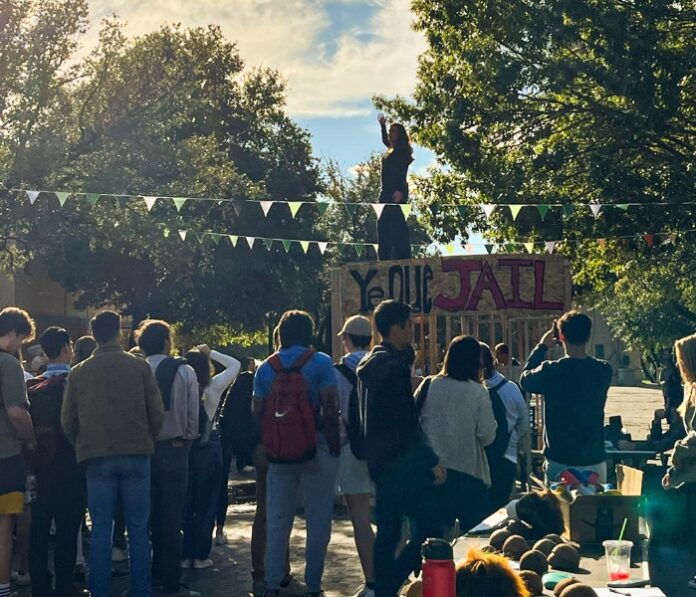Sometimes tradition needs to die
Senior year is an opportunity for reflection and reminiscence, for introspection and intrepidity. As I look back on my years at the University of Dallas, there are many things that I have loved here.
But as we read in Lit Trad II, even Paradise has its flaws. As we study in West Civ II, the greatest Western institutions require reformation. And so, as I prepare to graduate, I exhort my fellow citizens of the University of Dallas: It is time for Charity Week to die.
Anne of Green Gables girlishly exclaims, “I’m so glad I live in a world where there are Octobers.” But I regret that I cannot join Anne in her optimistic naivete so long as this ominous week remains on UD’s calendar.
Our university prides itself as being “The Catholic University for Independent Thinkers.” We fight the dangerous trends of modernity, social media and Kantianism with a tenacity forged in the courageous pages of “The Iliad”. We flick our long skirts with the whimsy of Mary Crawford and straighten our button downs with the confidence of Raskolnikov.
As exhorted in John 16, we strenuously labor through countless hours of what has stretched from Midterms Week into Midterms Month. Fueled by Cafe Bustelo, we taste transcendence in the earliest hours of the morning, churning out yet another paper before boldly turning to study for our next exam.
But then midterms end. And rather than erect an altar of gratitude for the survival of our battle, what emerges on the Mall?
A jail. A flimsy, wooden clink that annually undulates in the wind, especially beneath the bizarre footsteps of a Bernardine dragon and a bearded St. George.
You may tell me to look more closely at the name “Charity Week” and perceive the university’s ideals of virtue, truth and wisdom within this misleadingly beloved tradition. But I tell you that I can pull out a map of Dante’s Inferno and point to the place reserved for each of these traditions to which we cling every Fall.
What encourages pride like a talent show in which we applaud UD students who have the audacity to share their skills in ballet, song and stand-up? Why do we endorse gluttony through a bake sale, or avarice through a silent auction?
Charity Week is entirely entrenched in sloth, the vice by which one lazily and sadly shrinks from a spiritual good. We could recite most of the Prima Pars from memory in the time it takes to plan, organize and “celebrate” Charity Week. Instead, we pay for Tuck-Ins that force students to sleep rather than continue to pour over Plato and poetry into the dawn.
Last year, Fr. Thomas Esposito, O.Cist. offered to his Principles of Catholic Biblical Interpretation students the ennobling assignment of reading the entire New Testament for Friday of Charity Week. How did these ungrateful, slothful, reprobate theology majors respond?
Like Judas they tossed at the jailers a dollar to gain a free 50 minutes, shirking their responsibility to learn, trading draconian ideals of academic excellence for dragonish liberty.
Above all other sins, however, Charity Week endorses the vice of envy. For some reason that I still fail to comprehend, every person who attends or attended a different school practically turns green whenever I describe this UD tradition.
Misguided students, such as the 4th Floor Clark RA, President of the Thomistic Institute, President of Sigma Tau Delta, and a Blessed is She Mentor, find true joy every year in the shenanigans that demarcate Charity Week. They see it as a symbol of true education and an invitation to delight in the quirky, grassless university that they call home.
Such students seem far too content in a system which encourages the incarceration of authority. They revel in a camaraderie with faculty which gives students the nerve to ask one professor to help prank another professor at 10 p.m. on a Tuesday night.
Above all, this week ignores and mocks the struggle of students languishing over JPo and senior theses. Buried beneath annotated bibliographies and the Chicago Manual of Style, these students hear the sound of music and mirth on the Mall.
Speeches atop the jail, laughter throughout the dorms and wigged philosophy professors seem to proclaim to these tired souls that there is more to one’s education than academic projects and time in the classroom; a higher force is at play than the immediate task laid before them in the library.
I argue that this force is nothing but a brief and heinous triumph of the Dionysian over the Apollonian. But for some fools, this week reveals the heart of UD. It depicts the belief that reading and contemplation, the jail and laughter are all at the service of the same thing: joyful charity.
Larisa Tuttle is a senior double major in Theology and English.
